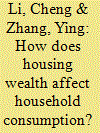|
|
|
Sort Order |
|
|
|
Items / Page
|
|
|
|
|
|
|
| Srl | Item |
| 1 |
ID:
088491


|
|
|
|
|
| Publication |
2009.
|
| Summary/Abstract |
The paper investigates the relationship between changes in asset wealth and the trend movements of household consumption in urban China. Using the vector error correction cointegration model, we demonstrate that there is a unique long-run cointegrating relationship between household consumption, disposable income, financial wealth and housing wealth in urban China. We find that housing wealth is the only factor that restores the long-run equilibrium relationship when the cointegrated system is disturbed by an external shock. In addition, our permanent-transitory variance decomposition analysis indicates that nearly all variance in the movement of consumption is permanent, supporting the classical random walk hypothesis of consumption behavior. However, a large proportion of variance in the short-run movements of housing wealth is found to be transitory.
|
|
|
|
|
|
|
|
|
|
|
|
|
|
|
|
| 2 |
ID:
182805


|
|
|
|
|
| Summary/Abstract |
Thanks to four-decade spectacular economic growth, China's households have been accumulating a stockpile of wealth. In such a context, further concerns have been raised about the relationship between wealth accumulation and improvement of economic well-being, mainly through consumption. The issue becomes even more important when considering the challenges facing China in recent years, which can be characterized by a mix of increasingly leveraged households, escalating housing price, sluggish consumption, slowing economic expansion, trade frictions with the United States, and the Covid-19 pandemic and resulting economic difficulties. With that background in mind, this paper first provides international evidence on the relationship between household consumption and wealth, especially in the form of houses. Drawing on a panel of aggregate data for fourteen countries including China, we find that household consumption positively responds to changes in housing wealth, and this link is further affected by different levels of government spending and financial development. We next relate the international evidence to the case of China, with the focus on some recent policy issues over housing regulations and consumption promotion. Importantly, as the evidence and underlying theories suggest, housing wealth-consumption association does not follow a simplistic pattern, and thus, multiple policy measures could and should be undertaken rather than merely curbing speculative activities in real estate exchanges and associated financial business.
|
|
|
|
|
|
|
|
|
|
|
|
|
|
|
|
| 3 |
ID:
187824


|
|
|
|
|
| Summary/Abstract |
We utilise the implementation of the 1999 higher education expansion in China as a natural experiment to examine the relationship between university educational attainment, homeownership and housing wealth. Using data from the 2018 China Family Panel Studies, results from our preferred models, which correct for endogeneity, suggest that having a university qualification generates a 3.5–6.3 percentage points increase in the probability of homeownership and a 24.3–51.1 percentage points increase in total housing wealth. We also find that holding a university qualification increases the number of houses one owns and housing wealth for those whose housing wealth is above the median. We find that self-reported social status and entitlement to superannuation are channels through which higher education affects homeownership and housing wealth and that financial literacy is a channel through which higher education affects housing wealth. We find considerable heterogeneity in the impact of higher education on housing outcomes across gender, family income levels, parent education and between urban and rural areas.
|
|
|
|
|
|
|
|
|
|
|
|
|
|
|
|
|
|
|
|
|